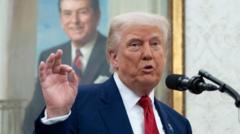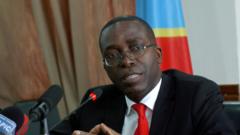The upcoming judicial elections in Mexico have sparked debate over the inclusion of candidates with alleged ties to organized crime, potentially undermining the independence of the judicial system. Critics of the reforms worry about the politicization of courts and the repercussions of electing judges based on popularity rather than legal expertise.
Concerns Arise Over Criminal Ties in Mexico's Judicial Elections

Concerns Arise Over Criminal Ties in Mexico's Judicial Elections
As Mexico prepares for its first-ever judicial elections, candidates with criminal backgrounds raise alarms about possible organized crime influence within the judiciary.
In what marks a pivotal moment for Mexico's judiciary, the nation is set to conduct its first-ever judicial elections, revealing a slate of candidates that includes individuals with criminal histories. Among the candidates, one served more than five years in a U.S. prison for drug smuggling, while others are linked to serious allegations related to organized crime and violence, including a scandal involving murdered journalists.
This unprecedented election is part of a significant overhaul of the judiciary that transitioned from an appointment-based system to one where judges and magistrates are elected by voters. Advocates of the reform, including former President Andrés Manuel López Obrador and current leader Claudia Sheinbaum, argue that the changes aim to enhance independence, eradicate corruption, and democratize the judiciary, offering citizens a direct voice in choosing their judges.
Despite these intentions, numerous legal professionals and critics warn that the elections could lead to a judiciary increasingly beholden to political interests, particularly that of the ruling Morena party. The transformation has raised concerns that the courts might become more susceptible to external pressures and influence, impacting their ability to function impartially.
With criminal organizations already deeply entrenched in various sectors across Mexico, including local governments and law enforcement, the presence of candidates with potential ties to crime raises alarms that these illicit groups could further entrench their influence via the judiciary. Fears persist that this evolving electoral process may inadvertently facilitate the establishment of connections between organized crime and judicial power, thereby jeopardizing the integrity of the country's legal system.



















